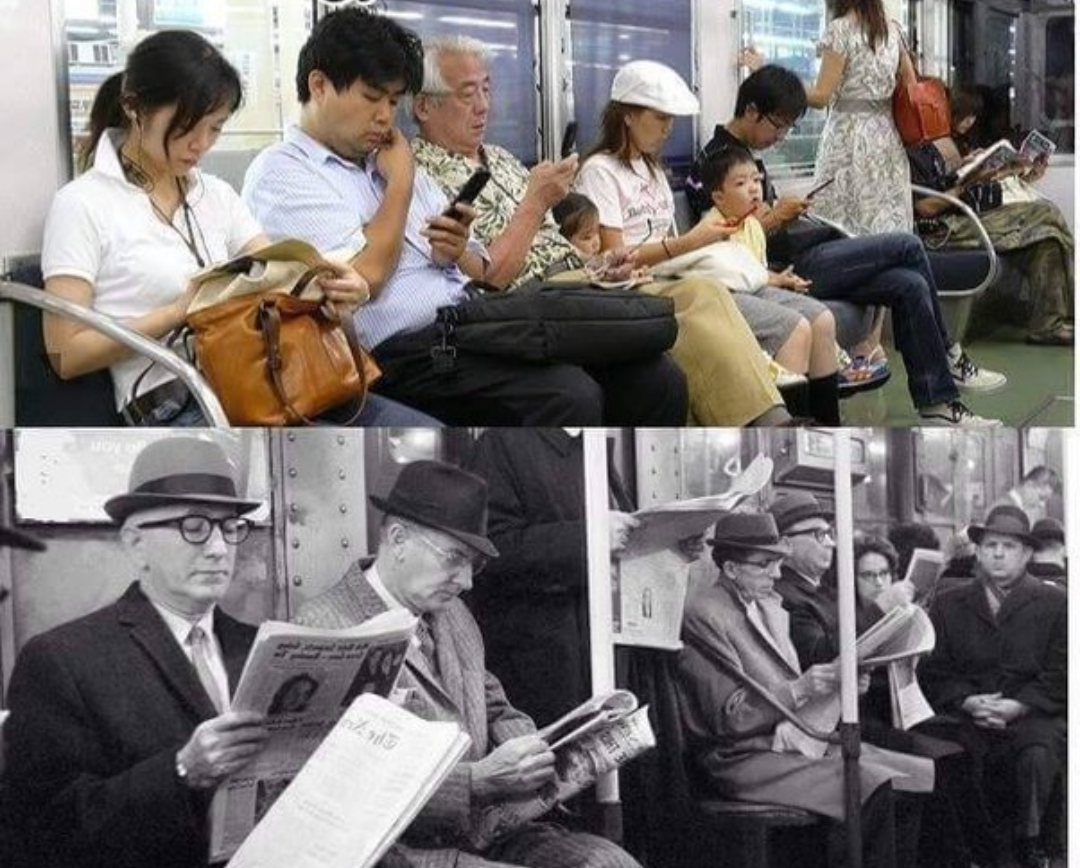- cross-posted to:
- technology@beehaw.org
- cross-posted to:
- technology@beehaw.org
Recently started using a LightPhone II when out of the house, and I found the article captured my current experience pretty well. It’s not so bad to be bored sometimes.
My grandparents grew up on the depression. They had a very simple life. They had a tv on wheels that lived in the closet and only came out once a month or so to watch a football game. They had a radio they turned on to listen to classical music while working. And they had a newspaper and magazine subscription.
They woke up early, tended to there chores and to the garden. Then they would eat a leasurly breakfast with lots of little plates and saucers (egg cups, juice, coffee and water glasses, etc), basically it was an activity that took an hour. Then more chores.
My grandma always had a project going, making cookies for a neighbor, helping someone find a job. My grandpa would spend most of the day in his workshop repairing lawnmowers or building fun inventions (solar ovens, bird houses, etc).
Lunch and dinner were also big presentations that took an hour. It was not always a lot of food, but they took a lot of time with it. After diner they would sit in two chairs side by side reading books or more often than not just sitting quietly. Neither talked much, they were just content to be.
They ran some errands occasionally, but there only big event for the week was going to church. I don’t remember them ever going out to dinner or even to a friends house, though they did have friends who stopped by.
Mostly they were content to do very little. They were never bored, or at least they were content to be bored. I think the one big negative all technology has brought us is that we’re restless if we can’t find something to do. We don’t enjoy just sitting and listening to life.
No one can remember.
Sad reality of a person with very small and very young friend circle.
👍
The title is a bit silly and doesn’t match the article.
People have all the time in the world to write better articles, better titles. I refuse to waste life on articles, that scream “clickbait” from a mile away…
We used pagers to tell people to call us back on payphones, possibly using collect call service. Music was listened to on Sony Walkmans, maybe a boombox if you wanted to be obnoxious about it. Newspapers were sold at every street corner to provide reading material.
I wouldn’t say it was so different before smartphones. Everyone on the train was browsing the news using the copy of the local paper instead of a cell-phone connected to some news network.
Collect call from “wehadababy itsaboy”, do you accept?
I’m glad I’m not the only one with this burned permanently into my memory.
i sometimes quote some of my favorites to the young generation and they look at me like im insane. 10-10-220, only a buck for the first 5 minutes and just a quarter after that for any long distance phone call!
Oh wow. Sometimes I can’t believe there are people that don’t know a world without smartphones and the internet. Then I read this and realize that there are more of them now and less of us.
If you were meeting up somewhere you’d arrange to have someone who was at home (and thus by a phone) to orchestrate any last minute changes of plan or notifications of late arrivals (via payphones, which were a thing, once).
You’d go into town regularly to pick up the new bus timetable.
You’d have a huge pile of maps in the back of the car, or one very big map book, often both. If you drove somewhere once, you’d remember the route the next time.
There was a set of encyclopedias at home to look up facts.
And a calendar on the wall. (That’s probably still a thing?)
There were a lot more newspapers and magazines around.
Everyone had a little notebook with all their important phone numbers in it. Filofax was revolutionary.
And we still remember the most important phone numbers from that little notebook because we had to dial them so very often.
We played eye spy a lot.
I do miss magazines. Websites aren’t the same as the excitement of your favorite magazine coming out after waiting for it a month. And there were ads, but they could flash or make sounds.
I still have a few phone numbers fully memorized and type them out when calling those specific people. More as an exercise to myself. Same thing with driving. I try not to use gps maps if Im going anywhere even when it’s multiple states away
Books, newspapers, video game consoles, broadcast television.
Because of the lack of communication you wasted a whole lot of time trying to see who was around and who wanted to do things. You’d buy 10 minutes over to Jimmy’s house see he’s not there bike 10 minutes back like 5 minutes the other direction then Gerald’s house.
Movie theaters and concessions used to be a lot less expensive even considering inflation.
There were malls and arcades. Department stores with cheap cafeterias.
As others have said standing in line was the worst. The best you could hope for was that you’d be able to do some people watching or maybe you got a book with you if you’re the type to read.
That reminds me, I used to carry a book everywhere. I certainly don’t do it half as much nowadays.
That and or a walkman
Flip the cassete and rewind it, fuck the tape is tangled… nvm you can untangle it…a bit of noise will not hurt your ears more than headphones you have
Turn On. Tune In. Drop Out.
Get past the pay wall with this link
Paywalls are a scourge on the modern Internet…
I have been thinking of switching to a dumbphone and a standalone Spotify player lately. I still have my old Garmin GPS, but don’t know if it still works. The idea of abandoning the smartphone is more daunting than I want to admit, but technology burnout is real.
The LightPhone has gps which is nice. Even transit directions. It’s slow as shit, but it got me out of a bind recently when dropping my car off for service suddenly became an overnight affair.
Yeah, but news papers are businesses that were built on paywalls. Want to get the NYT in 1990? Pay up, and they’ll deliver it in the morning.
Sadly, web advertising has not yielded the same revenue for newsrooms, and proper newsrooms and journalist have been downsizing and bleeding money for 20 years. So now they’ve brought back the paywalls that they had before the internet.
Newsroom should probably switch to nonprofits and do pledge drives. Go with the NPR model.
Or find the newspaper someone else was done with which was my way of doing things.
I used paper maps before internet and smart phones, I used to have a better sense of where I was . I bought a local map recently as well as a good compass, the compass just to get oriented in which direction things are.
I feel more connected and grounded than when using Google maps.
Surprises are part of this path but that’s true of any adventure.Paper maps -> printed map quest directions -> early GPS device -> Google maps with live updates.
Used them all.
Towns and Cities with numbered streets and avenues are super easy with regular maps.
Trying to find ANYTHING in a city of only named streets requires a huge amount of memorizing without search.
We can waste many hours in our smart phones because our lives today are too comfortable. So comfortable that people don’t even realise that.
Doing dishes without a dish washer takes at least one hour every day. Doing laundry without a washing machine takes a day. Do you know how much time it takes to bath two kids in a house without hot water supply? I can go on.
Shopping, cleaning, washing, going to work, traveling anywhere for any reason - every bloody action took A LOT OF TIME. You give smartphones to people 50-100 years ago and they won’t have time to use them.
The poorest people in advanced countries today literally live like kings of the olden days.
deleted by creator
The point the article tries to make is that we kind of were, we just got our dopamine from other, similarly meaningless pastimes like reading the backs of shampoo bottles.
I would argue there is a significant dosage difference. The internet can deliver experiences on par with hard-hitting emotional news, and can do it for hours straight.
Not even Dr Bronners can pull that off.
In that respect it’s mostly wrong. We were far more social for one. Spent most of our time talking on the phone or in person instead of typing. Friends came over and spent most of your time together instead of staying home and playing MP online. Stuck on the bus for 40 mins? Made a new friend. We didn’t get hit by cars crossing streets nearly as often, planned and internalized our trips instead of mindlessly following electronic instructions. Cooked full meals following realtime instructions given by mom instead of ordering takeout via app and so on.
A lot of the ‘culture’ nowadays is centred on what I think of as the ‘shortening attention span economy’ and I agree that smartphones are the predominant cause of that.

You can see they (we) enjoyed it more lol
There was an art to folding the paper in half again lengthways to read it without bothering the person next to you on the subway or bus—yet another skill I’ll never need again.
Limit your screen time to an hour a day and you’ll figure it out
Same shit but more of it. Life was less efficient but we didn’t know.
Read the back of schampoo bottles while on the toilet.
No podcast while doing chores so radio on constantly instead
Newspapers or books on trains and buses to pass the time
Queues were deathLol, I completely forgot about reading all the bathroom products while on the toilet. I had 3 sisters, so I knew all about how to use all kinds of feminine products.
Queues were death
They still are for me and my phone can’t help it, oh but one of my favorite Chinese handled can!
depending on the context the answer can vary a lot. some times its make small talk. sometimes its do dumb shit. sometimes its fucking. sometimes its just stuff tech nas made obsolete like a lot of adjustments on vehicles or machines.













